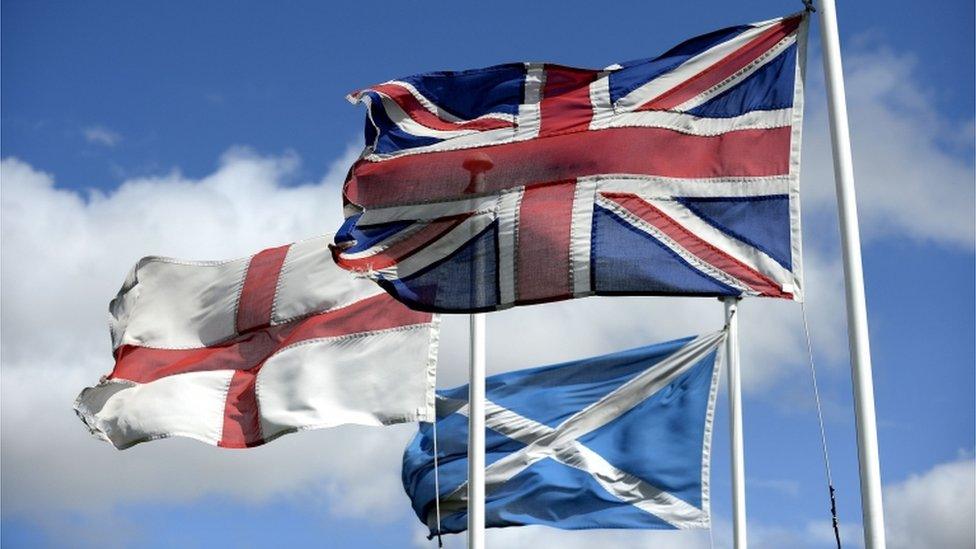Scottish perspectives of the future
- Published

BBC polling examined feelings of Britishness, Englishness and Scottishness
It can be a joy to revisit old television moments. No, dear reader, not my own early appearances on Reporting Scotland or Left, Right and Centre. Those, hopefully, have been suppressed on the grounds of taste.
Rather, I am thinking of other material. Over the weekend, my family and I chanced to be glancing at a DVD of Scotch and Wry, including the lugubrious Rev I.M. Jolly, portrayed gloriously by the incomparable Rikki Fulton.
Even today, as we observe him intoning solemnly that he has had a "helluva year", I crease with contented laughter. However, it appears that we must now banish the woebegone Rev.
Scotland, it seems, is far from gloomy and melancholic. Rather, we appear to feel in large part that our best days lie ahead of us.
I refer to the poll conducted for the BBC by YouGov. Details elsewhere on this website but perhaps I might be permitted to focus primarily on one question, regarding views of the future.
Folk in Scotland were much more inclined than their counterparts in England to view the best days as lying ahead. Nearly half of the respondents south of the border reckoned that England's best period was now in the past.
How to explain this? I discussed the issue with parents and grandparents at St Michael's Kirk in Linlithgow. They run a busy toddlers group and our chat was interspersed with joyous laughter and the occasional spat (the toddlers made even more noise).
A few were fretful, fearing for the future of their offspring and grandkids. But, in line with the BBC poll, more were optimistic.
Perhaps that is part of the natural hope which attends on childbirth. But we also detected, entirely unscientifically, a sense of social solidarity among the group.
However, Sir John Curtice, the psephological guru, offers an additional explanation for the differential. He reckons it arises from competing interpretations of the contemporary constitutional debate, particularly in England.
For the avoidance of doubt, I concur in his analysis. It has long seemed to me that the good and sensible people of England are somewhat puzzled as to their status. This features in three factors: post devolution disquiet, migration and - above all - the European Union.
They wonder, they ponder, what remains of Englishness. For decades, centuries, they scarcely questioned it, cheerfully conflating "English" with "British" and, in the past, with Empire.
Now, especially post devolution, they are obliged to ponder anew. They view their still conflated nation, England/Britain, as being to some extent in decline, as having lost global status.
Two nationalisms
Hence the apparent view in the poll that England's best days are in the past. Hence, also, the vote in England to leave the EU - in search of a rediscovered Englishness.
Sir John notes that comparable views are largely absent in Scotland. That there are, in essence, two "nationalisms".
One, in Scotland, driven in part by the SNP, is founded upon fostering confidence that civic Scotland can improve. The other, south of the Border, associated with Euro-scepticism and sections of the right, rests upon a belief that England's standing has been undermined and requires remedy.
To be clear, this does not mean that individual people are intrinsically happier or unhappier in Scotland or England. Just that the collective psyche is apparently affected by different interpretations of history and thus rival perspectives of the future.